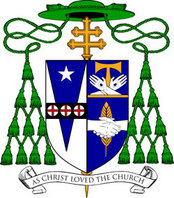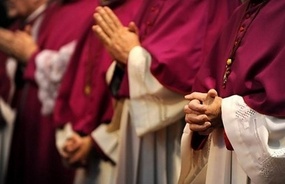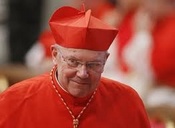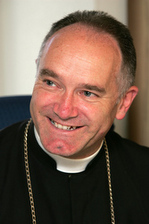
Yesterday's installation of Archbishop Charles J. Chaput as the new Archbishop of Philadelphia was beautiful on all avenues: music, word, gersture. One of many beautiful parts of his homily was on the ministry (vocation) of the bishop. For that part he quoted the great bishop and Doctor of the Church, Saint Augustine of Hippo. You may think I am cynical by saying this, but I wonder sometimes how often our bishops live up to their vocation as the Church has expected and how often they reflect on the words of a brother such as the eminent Augustine. Perhaps not often enough. AND that is likely the reason Archbishop Charles mention the vocation his homily.
What follows is a terrfic teaching on this vitally vigorous vocation of the Church.
Thanks be to God for the Archbishop!
St. Augustine of Hippo, speaking in the 4th century captured the role of the bishop in these words:
"Jerusalem had watchmen who stood guard . . . And this is what bishops do. Now, bishops are assigned this higher place" -- the bishop's chair in the basilica -"so that they themselves may oversee and, as it were, keep watch over the people. For they are called episkopos in Greek, which means 'overseer,' because the bishop oversees; because he looks down from [his chair] . . . And on account of this high place, a perilous accounting will have to be rendered [by the bishop] - unless we stand here with a heart such that we place ourselves beneath your feet in humility."

Another time, on the anniversary of his episcopal ordination, Augustine described the bishop's duties in the following way:
"To rebuke those who stir up strife, to comfort those of little courage, to take the part of the weak, to refute opponents, to be on guard against traps, to teach the ignorant, to shake the indolent awake, to discourage those who want to buy and sell, to put the presumptuous in their place, to modify the quarrelsome, to help the poor, to liberate the oppressed, to encourage the good, to suffer the evil and to love all men."
It's crucial for those of us who are bishops not simply to look like bishops but to truly be bishops. Otherwise, we're just empty husks -- the kind of men Augustine meant when he said,
"You say, 'He must be a bishop for he sits upon the cathedra.' True - and a scarecrow might also be called a watchman in the vineyard."
 The Vatican office organizing the "talks" between the Holy See and the Society of Saint Pius X issued a press release going over some of the areas of concern between the two. William Cardinal Levada, Prefect of the Congregation for the Doctrine of the Faith met today for two hours with Bishop Bernard Fellay. Among the issues presented and discussed was the set of principles called the "Doctrinal Preamble" which is outlining the ecclesial solution of bringing the SSPX into full communion with the Catholic Church. Some are thinking that the pastoral solution might be akin to that of a personal prelature like what the Opus Dei is in the Church.
The Vatican office organizing the "talks" between the Holy See and the Society of Saint Pius X issued a press release going over some of the areas of concern between the two. William Cardinal Levada, Prefect of the Congregation for the Doctrine of the Faith met today for two hours with Bishop Bernard Fellay. Among the issues presented and discussed was the set of principles called the "Doctrinal Preamble" which is outlining the ecclesial solution of bringing the SSPX into full communion with the Catholic Church. Some are thinking that the pastoral solution might be akin to that of a personal prelature like what the Opus Dei is in the Church.



